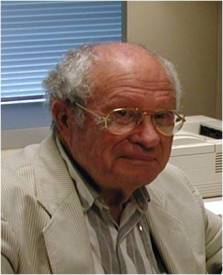About
In Memoriam: Lucien M. Biberman,
Mar 28, 2010
In Memoriam: Lucien Morton Biberman, 1919–2010
Lucien M. Biberman, an OSA Fellow internationally known for his contributions to electro-optical/infrared (EO/IR) technology and phenomenology, died on March 28, 2010 in Silver Spring, MD. He was 90.
In a career spanning more than four decades, Mr. Biberman conducted pioneering research in infrared detectors, sensors, missile seekers and night vision. He was instrumental in the development and use of Forward-Looking Infrared and the design of the Sidewinder infrared air-to-air missile. Between the late 1940’s and the mid-1990’s, no military EO/IR system was fielded by the United States without Mr. Biberman’s involvement.
A native of Philadelphia, PA, Luc Biberman received his Bachelor of Science degree at Rensselaer Polytechnic Institute and did graduate work at the Stevens Institute of Technology, Harvard University and UCLA. He worked for the US Navy as Physicist in Charge of the Mayport (Florida) Magnetic Survey Range (1942–1944), demagnetizing warships. His expertise in high-speed photography was used to evaluate the aerodynamics of the bomb shapes used for the first nuclear weapons.
From 1944 to 1957, Mr. Biberman held a variety of positions at what is now known as the Naval Air Weapons Station China Lake. While working at China Lake, he developed the reticle seeker for the Sidewinder infrared air-to-air missile and is one of the patent holders of the so-called multislit scanner. One of the first infrared homing missiles, the Sidewinder is widely considered to be the most effective air-to-air missile ever built; in fact, upgraded versions of the design are still in use today, more than 50 years after Biberman’s design was first fielded. He received a patent for the basic missile warning technology that is now used on all Special Forces Aircraft, Marine Combat Aircraft, on most Navy helicopters and on the US presidential aircraft.
In 1957, Biberman became the Associate Director of the Laboratories for Applied Sciences, University of Chicago. While there he continued his work in IR, publishing numerous papers on atmospheric attenuation in the infrared, IR targets and backgrounds, high altitude early warning systems and ballistic missile defense. He stayed at the University of Chicago until 1963, when he became a Research Staff Member at the Institute for Defense Analysis (IDA), an Alexandria, VA, nonprofit organization that administers federally funded defense research centers.
In 1970, he took a sabbatical to teach a course at the Technion in Haifa, Israel, and then to become a visiting professor in the Department of Electrical Engineering at the University of Rhode Island. He remained an active member of the IDA research staff until his retirement in 1996, retaining an advisory role well into his eighties.
An OSA member for over fifty years, Biberman was elected as a Fellow in 1965. He was also a Life Fellow of the Institute of Radio Engineers (IRE) and later of the Institute of Electrical and Electronics Engineers (IEEE), and a Fellow of the Society for Information Display, the Washington Academy of Sciences, and the Infrared Information Symposium (IRIS, later the Military Sensing Symposia (MSS)).
He authored over 100 technical publications, wrote and/or edited four books and numerous book chapters, and taught many courses. Biberman received countless awards throughout his career, including the MSS Sendall-Rosell Achievement Award for his important contributions to the passive sensors field, and the IDA’s Andrew J. Goodpaster Award for excellence in research. He was valued by his colleagues for the breadth of his influence on programs and on individuals, and for his generosity as a mentor.
Lucien Biberman is survived by his wife, Virginia Hewitt Biberman, a sister, two daughters, six grandchildren and four great-grandchildren. He was predeceased by his first wife, Anne Wilner Biberman, and a daughter, Leslie Biberman Gordon.
Per Mr. Biberman’s request, no funeral service was held. As he was an avid fisherman, his family suggested that friends go fishing in his honor. In lieu of flowers, contributions may be sent to the FishAmerica Foundation in support of the Family and Youth Casting Call's kid's fishing day.
If you would like to make a memorial donation to the OSA Foundation in honor of Lucien Biberman, please visit www.osa-foundation.org/give.
